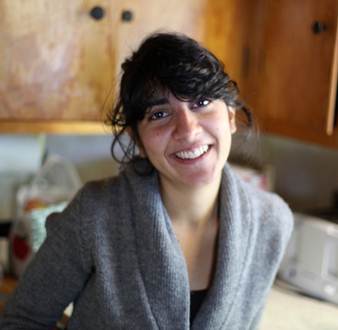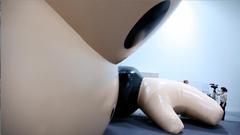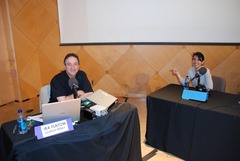
Name Flora Lichtman
- Education B.A. Environmental Studies, Yale University, 2005
- Target Audience Undergraduate

How does a girl transform taking soleus in the tone of an NPR radio program into a happenstance career? Flora Lichtman did just that through persistence and "lack of dignity" as she jokingly describes it. Flora's journey to becoming Multimedia Editor for NPR's Science Friday is a tale of science, art and personal determination. Read more to find out what makes Flora's field of science journalism so cool!
 I am the Multimedia Editor for Science Friday, a weekly program on National Public Radio (NPR). As multimedia editor, I film and edit videos for the Science Friday website and chat about them on the radio. Sometimes, I integrate the original content I create with content provided by the organization or scientist I'm interviewing. I am also part of a team that collaborates to come up with ideas for the weekly show.
I am the Multimedia Editor for Science Friday, a weekly program on National Public Radio (NPR). As multimedia editor, I film and edit videos for the Science Friday website and chat about them on the radio. Sometimes, I integrate the original content I create with content provided by the organization or scientist I'm interviewing. I am also part of a team that collaborates to come up with ideas for the weekly show.
My interests began to come together in college. I majored in Environmental Studies, which integrates multiple disciplines--science, research, writing and policy. Environmental Studies is broad enough that you graduate with a diverse skill-set that can be easily applied to different jobs, which was a good fit for me. I also became more interested in journalism while working as an editor for a non-fiction student publication in college.
Every Monday the SciFri team gets together for an editorial meeting. In this meeting, we pitch our top picks for Friday's show. Ira Flatow, the host of Science Friday, and the staff hash out which to do and which to shelve. By the end of Monday, we have tentative lineup for Friday's program and , including the video I'll be working on. On Tuesday and Wednesday I am filming, by Thursday I have a rough draft, and Friday morning the video and radio scripts are finalized for the show. There are definitely times when the week doesn't go as planned, but that's the basic process.
Friday's show. Ira Flatow, the host of Science Friday, and the staff hash out which to do and which to shelve. By the end of Monday, we have tentative lineup for Friday's program and , including the video I'll be working on. On Tuesday and Wednesday I am filming, by Thursday I have a rough draft, and Friday morning the video and radio scripts are finalized for the show. There are definitely times when the week doesn't go as planned, but that's the basic process.
I learn something new everyday-from the topics I cover, to the techy skills I use when filming and editing video. One of my favorite segments so far is the "Egg Sprinkler." I spoke to engineer Tadd Truscott, of Brigham Young University, who investigated what happens when you spin a hard-boiled egg in a puddle of milk. If you try this at home, you'll see the milk climb up the sides of the egg and spray off at the egg's center, mimicking a sprinkler. Dr. Truscott wanted to understand why this happens. I think what I liked so much about this piece is that anyone can do this experiment at home.
I suppose I didn't equate what I enjoyed doing as a kid (exploring salt marshes, collecting animals and being out in nature) as science. Both math and science classes sometimes intimidated me, but I I learned that if I worked hard enough, I could get through almost any subject (most of the time). Yale also has one of the oldest Forestry programs in the US - so I got to take really top-notch classes in college that hooked me on science.
When I graduated college, I moved to Italy to work as a researcher at a NATO oceanographic lab, studying the effects of noise on marine mammals. I was living in a tiny town home to mostly Italian senior citizens, so I had a lot of free time... like on Friday nights, which happened to be when Science Friday came on my satellite radio. I started listening to the show and the tone of the program resonated with me. I kind started to fantasize about working at Science Friday, and eventually mustered the courage to email Ira Flatow.
It was a long road. And come on, who likes job seeking? Ira got my email and was kind enough to offer me to offer me, a college grad with a lot of enthusiasm, but not a lot of experience, an internship. I was lucky -- the internship was challenging, creative and taught me a lot but New York is expensive, and interns aren't raking in big bucks (any bucks). So, I ended up taking another job, but stayed in touch with Ira, and eventually was offered a full-time position. It sounds easier than I remember it-I had many moments of extreme doubt and mild despair.
The challenges don't cease when you land the job- which is a good thing actually. Sometimes I pitch ideas in our editorial meetings that I am convinced are fantastic. I have a picture in my mind of how my week will look in terms of getting the segment ready, and then the idea gets canned. You have to be flexible.
I had a lot of inspirations. I read E.B. White books as a kid, watched movies about the ocean and I can't get enough deep sea specials. I also got really excited about what I learned in biology classes in college. I have also been fortunate enough to have supportive mentors. What Ira has created with Science Friday is really inspiring. He is the advocate for regular people trying to understand science, which I admire.
Contribute to your college newspaper, magazine or radio station. Make your own radio program. Also, do an internship. They are so important and a really great way to get exposure to an organization.
There are internships and fellowships available for recent graduates that provide great experience. In terms of graduate degrees, there are really so many different directions you can go. If you have a strong science foundation, a master's in journalism may make sense. Alternatively, if you're background is journalism you may want to pursue an advanced degree that focuses on science journalism so you can build your science foundation.
Some feel anxious about the long term stability of mediums like radio, but my personal hunch is that as long as we have cars there will be a need for radio. The biggest changes will come with the way we consume radio and interact with it.
(as adapted from www.npr.org, www.salary.com)
Why did you choose your major? Did you always know this is what you wan…
Lisa Ingham excels on the field and in the classroom as an Engineering …
Why did you choose your major? Did you always know this is what you wan…